If You’ve Just Got 5 Minutes
 Maybe by now you are all tired of me pointing to this or that talk, always saying how terrific it is, how clear or inspiring or whatever… posting a link and more or less assuming that you’ve all got plenty of time to listen to hour-long dharma talks.
Maybe by now you are all tired of me pointing to this or that talk, always saying how terrific it is, how clear or inspiring or whatever… posting a link and more or less assuming that you’ve all got plenty of time to listen to hour-long dharma talks.
Which, of course, is not the case.
So I’m going to try something different this time.
If you DO happen to have an extra hour…I highly recommend listening to this talk by Ajahn Sucitto. (It’s the introductory talk he gave at a weeklong retreat on the theme of: The Deeper You Go, the Lighter it Gets.)
If you DON’T have an hour….see if you can find just 5 minutes to listen to what seems to me to be the real heart of this practice. (Start at about 5 minutes into the talk and go to about the 10-minute mark.)
And if you don’t even have 5 minutes….just listen to 1 minute (between the 5- and 6-minute mark.)
For me, that’s the bit that says it all.
And Still, Things Change
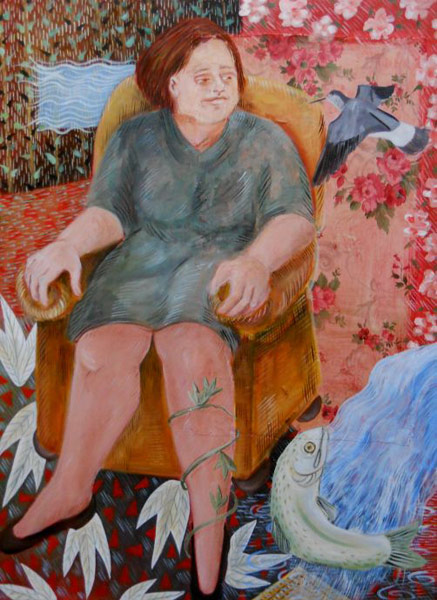 For today, one of “Twelve Pebbles” from The Beauty, by Jane Hirshfield:
For today, one of “Twelve Pebbles” from The Beauty, by Jane Hirshfield:
A map open on one table, a guidebook on the other
‘I am here.
I want to be nowhere but here’,
says the still hanging apricot,
growing rounder
like a page from Lewis Carroll.
***
(image by Gail Siptak)
Beginning and Ending
 Here’s a very interesting practice I’ve decided to try…which I heard Norm Fischer suggest on a talk I listened to on Dharma Seed. The practice is a variation on one of the trainings he outlines in his book, Training in Compassion: Zen Teaching on the Practice of Lojong, and it’s a way to work with the slogan: “Begin at the Beginning; End at the End.”
Here’s a very interesting practice I’ve decided to try…which I heard Norm Fischer suggest on a talk I listened to on Dharma Seed. The practice is a variation on one of the trainings he outlines in his book, Training in Compassion: Zen Teaching on the Practice of Lojong, and it’s a way to work with the slogan: “Begin at the Beginning; End at the End.”
Here’s the practice:
Train yourself, so that at the beginning of the day, as soon as your feet first strike the floor as you get out of bed, stop for a moment, take one breath….and remind yourself of your deepest intention…whatever it may appear to be, in that moment. Say to yourself, “What do I want to do with this day of my life.”
And then go forth.
At the end of the day, just as you’re getting into bed, while your feet are still on the floor, stop for a moment, and say one word to yourself: “Grateful.” Just see what comes into your mind.
And then be open to it.
***
You can listen to Norm’s full talk here, or go to the last 3 minutes to hear him talk about these instructions.
I, too, am Asleep in America
 I bought a new iPhone yesterday (Rose Gold, very chic) because my old iPhone wouldn’t synch with my new Mac Pro, which I had to get because my old Mac Pro couldn’t run the latest version of Skype and the video kept freezing up on me, and it wouldn’t run the latest version of Quicken so I was worried about losing tech support, and Google docs kept showing me a little dinosaur image telling me that I needed to upgrade to a newer browser, but I couldn’t because my Mac Pro was too old.
I bought a new iPhone yesterday (Rose Gold, very chic) because my old iPhone wouldn’t synch with my new Mac Pro, which I had to get because my old Mac Pro couldn’t run the latest version of Skype and the video kept freezing up on me, and it wouldn’t run the latest version of Quicken so I was worried about losing tech support, and Google docs kept showing me a little dinosaur image telling me that I needed to upgrade to a newer browser, but I couldn’t because my Mac Pro was too old.
All this…while the school system in the city of St. Louis, where I live, is in shambles; while there are homeless people living under the highway overpass I drive on when I go to the Symphony…and, of course, while there is Ferguson.
America
by Tony Hoagland
Then one of the students with blue hair and a tongue stud
Says that America is for him a maximum-security prison
Whose walls are made of RadioShacks and Burger Kings, and MTV episodes
Where you can’t tell the show from the commercials,
And as I consider how to express how full of shit I think he is,
He says that even when he’s driving to the mall in his Isuzu
Trooper with a gang of his friends, letting rap music pour over them
Like a boiling Jacuzzi full of ballpeen hammers, even then he feels
Buried alive, captured and suffocated in the folds
Of the thick satin quilt of America
And I wonder if this is a legitimate category of pain,
or whether he is just spin doctoring a better grade,
And then I remember that when I stabbed my father in a dream last night,
It was not blood but money
That gushed out of him, bright green hundred-dollar bills
Spilling from his wounds, and–this is the weird part–,
He gasped, “Thank god–those Ben Franklins were
Clogging up my heart–
And so I perish happily,
Freed from that which kept me from my liberty”–
Which is when I knew it was a dream, since my dad
Would never speak in rhymed couplets,
And I look at the student with his acne and cell phone and phony ghetto clothes
And I think, “I am asleep in America too,
And I don’t know how to wake myself either,”
And I remember what Marx said near the end of his life:
“I was listening to the cries of the past,
When I should have been listening to the cries of the future.”
But how could he have imagined 100 channels of 24-hour cable
Or what kind of nightmare it might be
When each day you watch rivers of bright merchandise run past you
And you are floating in your pleasure boat upon this river
Even while others are drowning underneath you
And you see their faces twisting in the surface of the waters
And yet it seems to be your own hand
Which turns the volume higher?
Kansas City Here We Come!
 Several of us are planning to hit the road on Friday, May 20, to attend a very cool weekend retreat in the Kansas City area led by Anushka Fernandoppule. The cost is $60 (plus a donation to the teacher.) There are no more rooms left at the center, but some of us will be camping on site ($3 per night). We leave St. Louis at noon on Friday (5/20) and plan to be back on Sunday evening (5/22 at about 7:30pm).
Several of us are planning to hit the road on Friday, May 20, to attend a very cool weekend retreat in the Kansas City area led by Anushka Fernandoppule. The cost is $60 (plus a donation to the teacher.) There are no more rooms left at the center, but some of us will be camping on site ($3 per night). We leave St. Louis at noon on Friday (5/20) and plan to be back on Sunday evening (5/22 at about 7:30pm).
Want to join us? Email me here. (For more info and to register, click here.)
Want a head start? Listen to this very cool talk given by Anushka at Spirit Rock last month, titled: Evolving Together: Meditation and Modern Science. (Click here.)
Hope Grows from Action, Not Thought
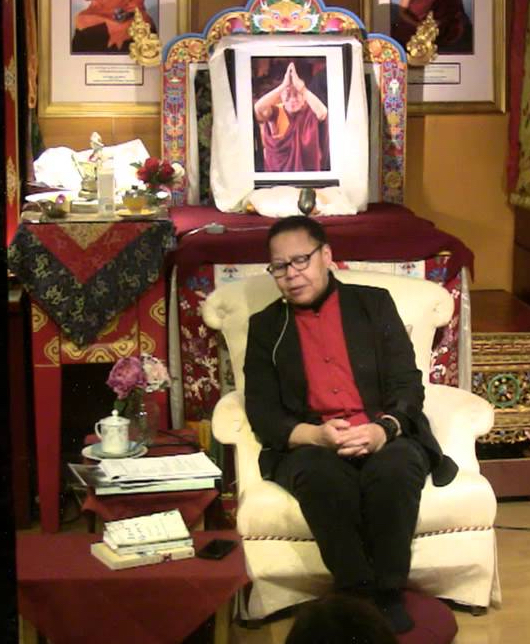 One of the truly inspiring guest teachers at the CDL retreat was Jan Willis, retired Professor of Religion at Wesleyan University and author of Dreaming Me: Black, Baptist, and Buddhist. She talked about growing up in the Jim Crow South, marching with Dr. Martin Luther King, Jr. (whom she calls “that African-American bodhisattva of our time”), and opening to Buddhism as a way to heal the deep wounds of racism. To those who think Activism is not necessarily a part of Buddhism she responds: Activism goes all the way back to when the Buddha first stood up under that Bodhi tree!
One of the truly inspiring guest teachers at the CDL retreat was Jan Willis, retired Professor of Religion at Wesleyan University and author of Dreaming Me: Black, Baptist, and Buddhist. She talked about growing up in the Jim Crow South, marching with Dr. Martin Luther King, Jr. (whom she calls “that African-American bodhisattva of our time”), and opening to Buddhism as a way to heal the deep wounds of racism. To those who think Activism is not necessarily a part of Buddhism she responds: Activism goes all the way back to when the Buddha first stood up under that Bodhi tree!
In Lion’s Roar magazine she writes, “In 1963, as a teenager, I had the good fortune of participating in the ‘Birmingham campaign’ for civil rights led by Reverend King. It was a hopeful time. Feeling part of a larger community of like-minded nonviolent protestors, I felt buoyed up by the possibility of triumph over injustice. When, later, after leaders like Malcolm X, King and the Kennedys had been struck down by violence, a period of hopelessness settled in.
“For many of us today that hopelessness still seems to hold sway. And so, before we endeavor to change the world, we need to rekindle hope again. The thing I’ve learned about hope, however, is that it grows from action, not from thought. If we wish to see an enlightened world of peace and justice for all, we have to move beyond merely imagining it, to nonviolent actions, however small, that will help to usher it in.”
Let the Room Hold Them
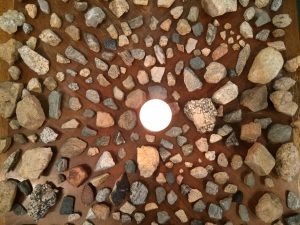 Jack Kornfield was one of the teachers at the CDL training retreat I attended. He said that as Community Dharma Leaders, we may be called upon to perform weddings, funerals, blessings, rites of passage, dedication ceremonies, baby blessings, and many other types of rituals to mark significant events in the lives of our sangha members. So he taught us the elements that make up these rituals and then we practiced a few of them.
Jack Kornfield was one of the teachers at the CDL training retreat I attended. He said that as Community Dharma Leaders, we may be called upon to perform weddings, funerals, blessings, rites of passage, dedication ceremonies, baby blessings, and many other types of rituals to mark significant events in the lives of our sangha members. So he taught us the elements that make up these rituals and then we practiced a few of them.
The most moving was the most simple: a grief ritual, in which we each went out into the desert to collect a stone for someone we wanted to honor — someone who had died or who had suffered a great loss — and then we brought the stone back into the hall, where we each knelt and placed it on a small table, in the middle of which Jack had lit a candle. (See photo above)
No official words were spoken. We simply sat together in a sacred silence.
In honor of which I offer:
In a Room with Five People, Six Griefs
by Jane Hirshfield
In a room with five people, six griefs.
Some you will hear of, some not.
Let the room hold them, their fears, their anger.
Let there be walls and windows, a ceiling.
A door through which time
changer of everything
can enter.
Yes! And Yes!
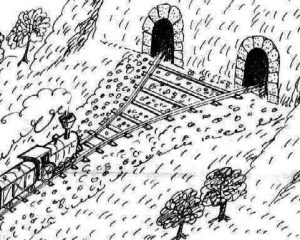 At the Community Dharma Leader (CDL) training retreat I just attended, we spent a lot of time working with–and trying to find our own words for–Nagarjuna’s teaching on the Two Truths, as expressed in a collection of poems titled, Verses from the Center.
At the Community Dharma Leader (CDL) training retreat I just attended, we spent a lot of time working with–and trying to find our own words for–Nagarjuna’s teaching on the Two Truths, as expressed in a collection of poems titled, Verses from the Center.
Here’s an excerpt from Jay Garfield’s translation:
The Buddha’s teaching of the Dharma
Is based on two truths:
A truth of worldly convention
And an ultimate truth.
Those who do not understand
The distinction between these two truths
Do not understand
The Buddha’s profound teaching.
Without a foundation in the conventional truth
The significance of the ultimate cannot be taught.
Without understanding the significance of the ultimate,
Liberation is not achieved.
Here’s my take:
Things are as they are.
But there are 2 “are”s.
Is light a wave
Or a particle?
Yes!
Is the world real
Or a dream?
Yes!
Is it “me” who writes this
Or is it “not me”?
Yes!
How do I know that the answer is
Yes?
I see the
Light;
I know the
World.
And when I write,
It’s “me” who knows that
It’s “not me” who says
Yes!
Coming and Going
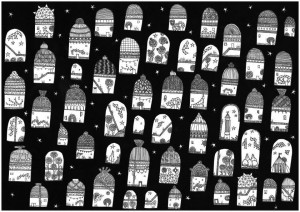 My brother and his wife are coming to St. Louis tomorrow to stay with me for a few days, and then I’m going out of town again…this time to attend another Community Dharma Leader (CDL) training retreat. I get back on April 28, but won’t be posting until May 2. Check back then.
My brother and his wife are coming to St. Louis tomorrow to stay with me for a few days, and then I’m going out of town again…this time to attend another Community Dharma Leader (CDL) training retreat. I get back on April 28, but won’t be posting until May 2. Check back then.
In the mean time, I leave you with this selection from Invisible Cities, by Italo Calvino. It’s my favorite “travel guide,” which I always consult whenever I leave–or return–home.
Cities & Eyes: 4
When you have arrived at Phyllis, you rejoice in observing all the bridges over the canals, each different from the others: cambered, covered, on pillars, on barges, suspended, with tracery balustrades. And what a variety of windows looks down on the streets: mullioned, Moorish, lancet, pointed, surmounted by lunettes or stained-glass roses; how many kinds of pavement cover the ground: cobbles, slabs, gravel, blue and white tiles. At every point the city offers surprises to your view: a caper bush jutting from the fortress’ walls, the statues of three queens on corbels, an onion dome with three smaller onions threaded on the spire.
“Happy the one who has Phyllis before their eyes each day and who never ceases seeing the things it contains,” you cry, with regret at having to leave the city when you can barely graze it with your glance.
But it so happens that, instead, you must stay in Phyllis and spend the rest of your days there. Soon the city fades before your eyes, the rose windows are expunged, the statues on the corbels, the domes. Like all of Phyllis’s inhabitants, you follow zigzag lines from one street to another, you distinguish the patches of sunlight from the patches of shade, a door here, a stairway there, a bench where you can put down your basket, a hole where your foot stumbles if you are not careful. All the rest of the city is invisible. Phyllis is a space in which routes are drawn between points suspended in the void: the shortest way to reach that certain merchant’s tent, avoiding that certain creditor’s window. Your footsteps follow not what is outside the eyes, but what is within, buried, erased. If, of two arcades, one continues to seem more joyous, it is because thirty years ago a girl went by there, with broad, embroidered sleeves, or else it is only because that arcade catches the light at a certain hour like that other arcade, you cannot recall where.
Millions of eyes look up at windows, bridges, capers, and they might be scanning a blank page. Many are the cities like Phyllis, which elude the gaze of all, except the one who catches them by surprise.
The Opposite of That
 In Buddhist psychology, equanimity is understood to be one of the “universal, beautiful factors of mind,” which always arise together in every wholesome mind state…along with confidence, mindfulness, a sense of dignity, non-greed, non-hatred, and non-rigidity.
In Buddhist psychology, equanimity is understood to be one of the “universal, beautiful factors of mind,” which always arise together in every wholesome mind state…along with confidence, mindfulness, a sense of dignity, non-greed, non-hatred, and non-rigidity.
In Mindfulness: A Practical Guide to Awakening, Joseph Goldstein writes, “For most of us, there is a deep conditioning in the mind to try to hold on to what is pleasant and to push away or avoid what is unpleasant. But it is precisely this conditioning that powers the rollercoaster of hope and fear….When equanimity is developed, we ride these waves with balance and ease.”
Which is exactly the opposite of what Tony Hoagland writes about here (so beautifully…and yet so painfully):
Personal
by Tony Hoagland
Don’t take it personal, they said;
but I did, I took it all quite personal–
the breeze and the river and the color of the fields;
the price of grapefruit and stamps,
the wet hair of women in the rain–
And I cursed what hurt me
and I praised what gave me joy,
the most simple-minded of possible responses.
The government reminded me of my father,
with its deafness and its laws,
and the weather reminded me of my mom,
with her tropical squalls.
Enjoy it while you can, they said of Happiness
Think first, they said of Talk
Get over it, they said
at the School of Broken Hearts
but I couldn’t and I didn’t and I don’t
belive in the clean break;
I believe in the compound fracture
served with a sauce of dirty regret,
I belive in saying it all
and taking it all back
and saying it again for good measure
while the air fills up with I’m-Sorries
like wheeling birds
and the trees look seasick in the wind.
Oh life! Can you blame me
for making a scene?
You were that yellow caboose, the moon
disappearing over a ridge of cloud.
I was the dog, chained in some fool’s backyard;
barking and barking:
trying to convince everything else
to take it personal too.
